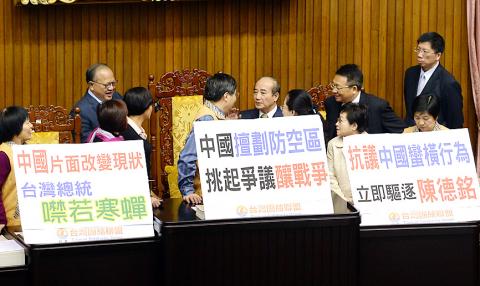The legislature’s caucus leaders, including the Chinese Nationalist Party (KMT), yesterday approved a non-binding resolution demanding that President Ma Ying-jeou’s (馬英九) administration lodge an official protest with China over its unilateral demarcation of an air defense identification zone (ADIZ) in the East China Sea.
The resolution asks Ma to file a stern protest against the Chinese demarcation, which it said has destabilized regional stability, and to take concerted action with the nation’s democratic allies by refusing to submit flight plans as Beijing has requested.
It also states that Beijing’s announcement of the ADIZ on Saturday last week and the Chinese aircraft carrier Liaoning’s passage through the Taiwan Strait on Thursday have escalated tensions that not only affect Taipei, but also Tokyo, Seoul and Washington.

Photo: Wang Yi-sung, Taipei Times
The resolution calls on China to exercise restraint, resolve the dispute with Japan, South Korea, Australia, Taiwan and the US through multilateral negotiations, and advises that China withdraw the demarcation to safeguard peace in the area.
Earlier yesterday, Taiwan Solidarity Union lawmakers had occupied the legislative podium to protest China’s action and called for a boycott of legislative proceedings. The deadlock was broken after Legislative Speaker Wang Jin-pyng (王金平) convened a cross-party meeting, and all party caucuses reached a consensus on the resolution.
However, the TSU’s proposal that visiting Association for Relations Across the Taiwan Straits Chairman Chen Deming (陳德銘) should be expeled was not included in the resolution.
The Executive Yuan issued a five-point statement in response to the resolution later yesterday.
First, the National Security Council had issued a four-point statement on Saturday last week in response to China’s ADIZ demarcation, in which it said that the government would firmly safeguard its sovereignty over the Diaoyutai Islands (釣魚台) and urges all concerned parties to exercise self-restraint to resolve regional disputes peacefully, the Executive Yuan said in the statement.
Second, China did not consult Taiwan before announcing its new ADIZ demarcation, which overlaps with Taiwan’s air defense zone and the Taipei Flight Information Region. This has not contributed to positive cross-strait relations, it said, adding that the government would “express our firm and serious concern to the mainland [China] through appropriate channels.”
Third, China’s air defense zone will not change how the military conducts operations in the region, and the military will increase inspections in the area to enhance air and sea defenses to protect national security and public interests, the statement said.
Fourth, the Civil Aeronautics Administration will handle issues related to the requirement imposed by China that commercial flights notify China before planes fly through the newly designated zone in line with related International Civil Aviation Organization regulations and based on requests made by airlines to ensure aviation safety, it said.
Fifth, the government is extremely concerned about how the situation develops and has made unequivocal calls to concerned parties to resolve disputes through bilateral or multilateral channels and in a peaceful manner to jointly maintain peace and stability in the region, the Executive Yuan said.
Executive Yuan spokesperson Cheng Li-wun (鄭麗文) declined to to elaborate when asked about the statement.

CHAOS: Iranians took to the streets playing celebratory music after reports of Khamenei’s death on Saturday, while mourners also gathered in Tehran yesterday Iranian Supreme Leader Ayatollah Ali Khamenei was killed in a major attack on Iran launched by Israel and the US, throwing the future of the Islamic republic into doubt and raising the risk of regional instability. Iranian state television and the state-run IRNA news agency announced the 86-year-old’s death early yesterday. US President Donald Trump said it gave Iranians their “greatest chance” to “take back” their country. The announcements came after a joint US and Israeli aerial bombardment that targeted Iranian military and governmental sites. Trump said the “heavy and pinpoint bombing” would continue through the week or as long

TRUST: The KMT said it respected the US’ timing and considerations, and hoped it would continue to honor its commitments to helping Taiwan bolster its defenses and deterrence US President Donald Trump is delaying a multibillion-dollar arms sale to Taiwan to ensure his visit to Beijing is successful, a New York Times report said. The weapons sales package has stalled in the US Department of State, the report said, citing US officials it did not identify. The White House has told agencies not to push forward ahead of Trump’s meeting with Chinese President Xi Jinping (習近平), it said. The two last month held a phone call to discuss trade and geopolitical flashpoints ahead of the summit. Xi raised the Taiwan issue and urged the US to handle arms sales to

State-run CPC Corp, Taiwan (CPC, 台灣中油) yesterday said that it had confirmed on Saturday night with its liquefied natural gas (LNG) and crude oil suppliers that shipments are proceeding as scheduled and that domestic supplies remain unaffected. The CPC yesterday announced the gasoline and diesel prices will rise by NT$0.2 and NT$0.4 per liter, respectively, starting Monday, citing Middle East tensions and blizzards in the eastern United States. CPC also iterated it has been reducing the proportion of crude oil imports from the Middle East and diversifying its supply sources in the past few years in response to geopolitical risks, expanding

An Emirates flight from Dubai arrived at Taiwan Taoyuan International Airport yesterday afternoon, the first service of the airline since the US and Israel launched strikes against Iran on Saturday. Flight EK366 took off from the United Arab Emirates (UAE) at 3:51am yesterday and landed at 4:02pm before taxiing to the airport’s D6 gate at Terminal 2 at 4:08pm, data from the airport and FlightAware, a global flight tracking site, showed. Of the 501 passengers on the flight, 275 were Taiwanese, including 96 group tour travelers, the data showed. Tourism Administration Deputy Director-General Huang He-ting (黃荷婷) greeted Taiwanese passengers at the airport and